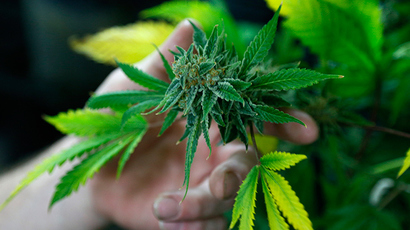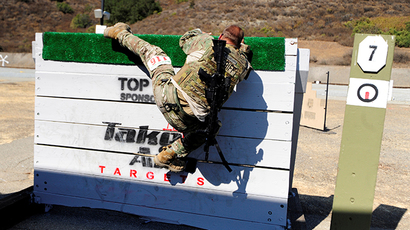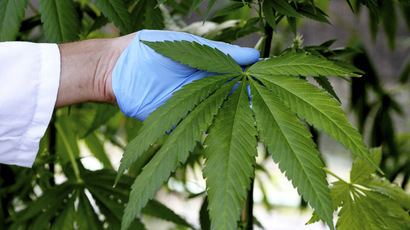Tattoos, doobies & you: Uncle Sam’s Air Force loosens recruiting restrictions
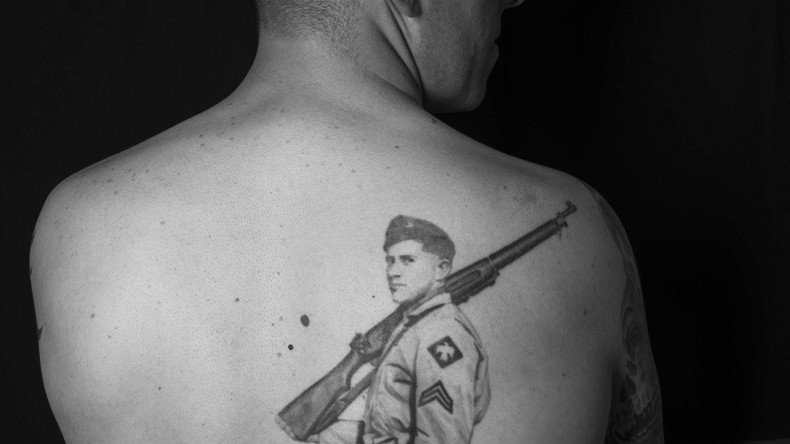
The US Air Force is updating its rules about tattoos, marijuana use and medical histories to gain new recruits barred from joining the service by its previous policies. Currently, one in 10 potential airmen have tattoos that disqualify them.
The Air Force is following in the footsteps of the US Marines in loosening its restrictions that prevent it from recruiting top talent who are interested in joining. Much of the new standards are based on current legal and fashion trends.
“As part of our effort to attract and retain as many qualified airmen as possible, we periodically review our accessions policies,” Secretary of the Air Force Deborah Lee James said in a statement. “In this instance, we identified specific changes we can make to allow more members of our nation to serve without compromising quality.”
Half of all people seeking to join the Air Force have tattoos; of those, one in five have “disqualifying” tattoos, according to a recent review of field recruiters. The biggest reason a candidate was barred from joining was for having “excessive” tattoos.
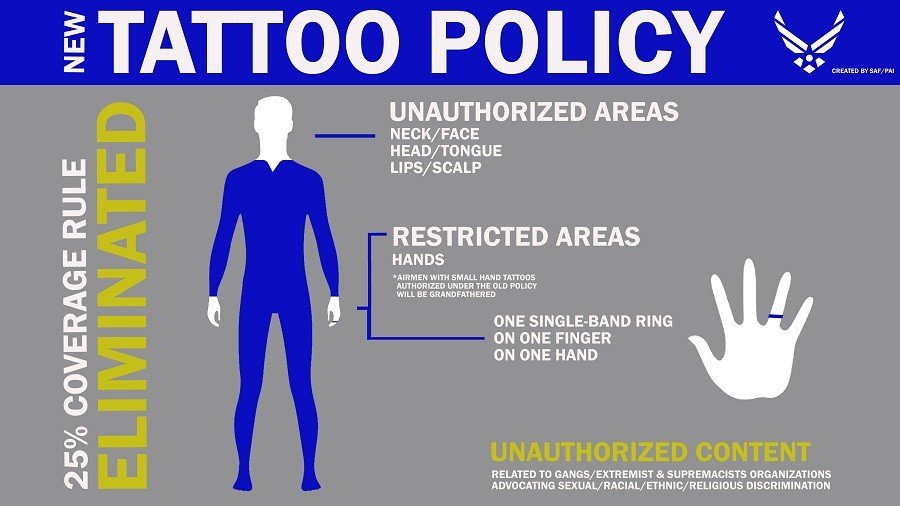
The current tattoo restrictions are called the “25 percent” rule, which allows for authorized tattoos on the chest, back, arms and legs that take up no more than 25 percent of the exposed body part. Under the new policy, the 25 percent rule will no longer be enforced, allowing for full sleeves or large body art.
There is one location where the Air Force tattoo policy has become more restrictive, though: Hand tattoos will now be limited to “one single-band ring tattoo, on one finger, on one hand,” the policy said. Previously, small tattoos were allowed on the hand under the 25 percent rule; airmen who already have such ink will be grandfathered in. The new hand policy “ensures the ability to present a more formal military image when required at certain events and/or with dress uniforms.”
Body markings of any sort that are “obscene, commonly associated with gangs, extremist and/or supremacist organizations, or that advocate sexual, racial, ethnic or religious discrimination” will remain prohibited, and commanding officers will also retain leeway to make the Air Force policy more restrictive.
With medicinal marijuana now legal in more than half of states and the District of Columbia, and recreational pot allowed in seven states and DC, the Air Force decided to change its policies to be “reflective of the continuing legalization of marijuana” by states. It is getting rid of the current numerical limitations on prior use. However, a diagnosis of substance abuse or addiction will remain as a disqualification. Legal proceedings for pre-service drug use will be looked at on a case-by-case basis, and applicants will be disqualified if they use drugs after their initial entrance interviews.
“Drug use and a career as a military professional do not mix. If you aspire to become an Airman, make choices that include sobriety, limit legal drug use and avoid substance abuse. In most cases, substance abuse is disqualifying,” the Air Force recruiting website currently reads.
The Air Force also addressed the rise in attention deficit hyperactivity disorder (ADHD) diagnoses in its policy by allowing a waiver for people who don’t meet the current standard. As of now, candidates must never have taken more than a single daily dosage of medication or not been prescribed ADHD medication for more than 24 cumulative months after the age of 14. The new waiver will be available for those who have demonstrated performance stability, either academic or vocational, off medication for at least 15 months prior to joining the military.
“We are always looking at our policies and, when appropriate, adjusting them to ensure a broad scope of individuals are eligible to serve. These changes allow the Air Force to aggressively recruit talented and capable Americans who until now might not have been able to serve our country in uniform,” said Chief Master Sergeant of the Air Force James A. Cody.
Two other medical conditions ‒ asthma and eczema ‒ were also addressed in the policy change, which will go into effect on February 1.
“These accession standards ensure we maintain our high standards while bringing more consistency to our policies," said Air Force Chief of Staff General David L. Goldfein. “As medical capabilities have improved and laws have changed, the Air Force is evolving so we are able to access more worldwide deployable Airmen to conduct the business of our nation.”
The Marine Corps overhauled its tattoo policy in June "to balance the personal desires of Marines with high standards of professional military appearance and heritage," the branch said in a statement. However, unlike the Air Force, full sleeves are still banned.
Neither of these upgrades addresses one of the biggest reasons people are disqualified from the military: obesity. By 2013, only a quarter of Americans was fit to serve. The Pentagon was expected to rewrite its fitness standards by the end of 2016 due to soaring obesity rates in the country. No new rules were announced, however.
